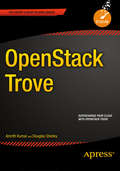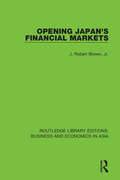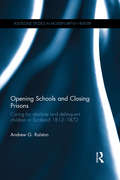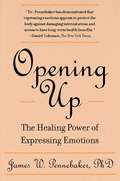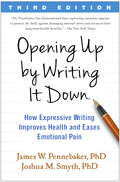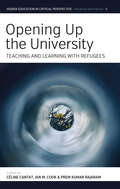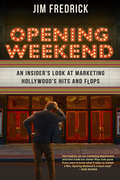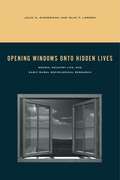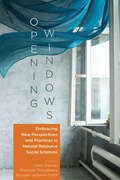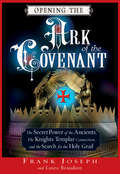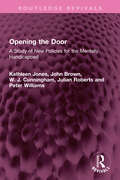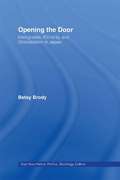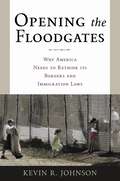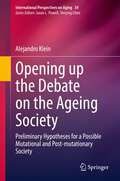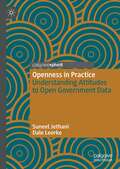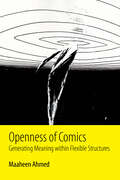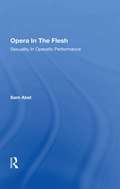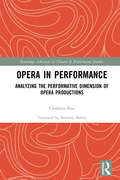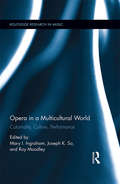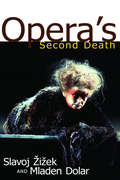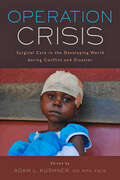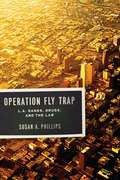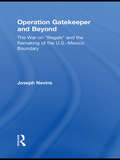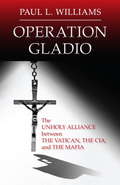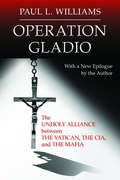- Table View
- List View
OpenStack Trove
by Amrith Kumar Douglas ShelleyOpenStack Trove is your step-by-step guide to set up and run a secure and scalable cloud Database as a Service (DBaaS) solution. The book shows you how to set up and configure the Trove DBaaS framework, use prepackaged or custom database implementations, and provision and operate a variety of databases--including MySQL, PostgreSQL, MongoDB, Cassandra, and Redis--in development and production environments. Authors Amrith Kumar and Douglas Shelley, both active technical contributors to the Trove project, describe common deployment scenarios such as single-node database instances and walk you through the setup, configuration, and ongoing management of complex database topics like replication, clustering, and high availability. The book provides detailed descriptions of how Trove works and gives you an in-depth understanding of its architecture. It also shows you how to avoid common errors and debug and troubleshoot Trove installations, and perform common tasks such as: What you'll learn Install and configure Trove Install preconfigured database technologies or guest images Launch database instances using Trove Perform common administrative tasks Resize and reconfigure database instances Take backups, and launch instances from existing backups Manage groups of database instances with configuration groups Debug and troubleshoot a Trove installation Set up replication and clustering Build custom guest images for use with Trove Who this book is for OpenStack Trove is targeted at a broad spectrum of readers, including software engineers seeking development agility with database-driven applications, devops engineers tasked with operating a database infrastructure with numerous databases, and data analysts looking to improve velocity by being able to quickly provision and release database capacity. Table of Contents 1 An introduction to Database-as-a-Service 2 Downloading and Installing OpenStack Trove 3 Basic Trove Operations 4 OpenStack Trove Concepts and Architecture 5 Advanced Trove configurations and operations 6 Debugging and Troubleshooting 7 Building custom guest images 8 Trove Configuration Files 9 Trove Quick Reference 10 Trove API 11 Trove Orchestration
Opening Japan's Financial Markets (Routledge Library Editions: Business and Economics in Asia #26)
by J. Robert Brown, Jr.This book, first published in 1994, takes a broad look at the reasons behind the failure of foreign banks to penetrate Japanese financial markets. It accepts the common argument that the Japanese bureaucracy has skilfully limited the scope of foreign banks and discusses at length the methods used to do so. However, in examining the history of foreign banking activity in Japan, it becomes clear that ineptitude on the part of the foreign banks and governments has also been a major factor.
Opening Schools and Closing Prisons: Caring for destitute and delinquent children in Scotland 1812–1872 (Routledge Studies in Modern British History)
by Andrew G. RalstonThe book covers the period from 1812, when the Tron Riot in Edinburgh dramatically drew attention to the ‘lamentable extent of juvenile depravity’, up to 1872, when the Education Act (Scotland) inaugurated a system of universal schooling. During the 1840s and 1850s in particular there was a move away from a punitive approach to young offenders to one based on reformation and prevention. Scotland played a key role in developing reformatory institutions – notably the Glasgow House of Refuge, the largest of its type in the UK – and industrial schools which provided meals and education for children in danger of falling into crime. These schools were pioneered in Aberdeen by Sheriff William Watson and in Edinburgh by the Reverend Thomas Guthrie and exerted considerable influence throughout the United Kingdom. The experience of the Scottish schools was crucial in the development of legislation for a national, UK-wide system between 1854 and 1866.
Opening Up
by James W. PennebakerAnyone who has ever entrusted a troubling secret to a journal, or mourned a broken heart with a friend, knows the feeling of relief that expressing painful emotions can bring. This book presents astonishing evidence that personal self-disclosure is not only good for our emotional health, but boosts our physical health as well. Psychologist James W. Pennebaker has conducted controlled clinical research that sheds new light on the powerful mind body connection. This book interweaves his findings with insightful case studies on secret-keeping, confession, and the hidden price of silence. Filled with information and encouragement, Opening Up explains Why suppressing inner problems takes a devastating toll on health How long-buried trauma affects the immune system How writing about your problems can improve your health Why it's never too late to heal old emotional wounds When self-disclosure may be risky--and how to know whom to trust
Opening Up by Writing It Down, Third Edition: How Expressive Writing Improves Health and Eases Emotional Pain
by James W. Pennebaker Joshua M. SmythExpressing painful emotions is hard--yet it can actually improve our mental and physical health. This lucid, compassionate book has introduced tens of thousands of readers to expressive writing, a simple yet powerful self-help technique grounded in scientific research. Leading experts James W. Pennebaker and Joshua M. Smyth describe how taking just a few minutes to write about deeply felt personal experiences or problems may help you: *Heal old emotional wounds *Feel a greater sense of well-being *Decrease stress *Improve relationships *Boost your immune system Vivid stories and examples yield compelling insights into secrets, self-disclosure, and the hidden price of silence. The third edition incorporates findings from hundreds of recent studies and includes practical exercises to help you try expressive writing for yourself. It features extensive new information on specific health benefits, as well as when the approach may not be helpful.
Opening Up the University: Teaching and Learning with Refugees (Higher Education in Critical Perspective: Practices and Policies #5)
by Prem Kumar Rajaram Céline Cantat, Ian M. CookThrough a series of empirically and theoretically informed reflections, Opening Up the University offers insights into the process of setting up and running programs that cater to displaced students. Including contributions from educators, administrators, practitioners, and students, this expansive collected volume aims to inspire and question those who are considering creating their own interventions, speaking to policy makers and university administrators on specific points relating to the access and success of refugees in higher education, and suggests concrete avenues for further action within existing academic structures.
Opening Weekend: An Insider's Look at Marketing Hollywood's Hits and Flops
by Jim FredrickIn a world where movie marketers are the stars of the story, Opening Weekend: An Insider's Look at Marketing Hollywood's Hits and Flops recounts Jim Fredrick’s journey through the realm of movie marketing. Fredrick offers readers exclusive access to behind-the-scenes anecdotes and firsthand accounts of working with studio executives and navigating relationships with famous movie stars and directors.After starting his career in 1983 as a trailer editor and producer at famed advertising boutique Intralink, Jim Fredrick went on to serve as president of marketing at Castle Rock Entertainment; senior vice president of creative advertising at Warner Bros.; and executive vice president of marketing at Sony Screen Gems. In 2011, he founded his own company, Jim Fredrick Motion Picture Marketing. Across a span of thirty-five years, Fredrick’s roles as a trailer maker and studio executive allowed him to craft advertising campaigns for a range of movies, from such iconic cinematic gems as The Shawshank Redemption to the widely beloved Harry Potter franchise, to commercial failures like The Adventures of Pluto Nash and Fired Up! Opening Weekend explores the intricacies of the lesser-known business of film distribution and marketing, unraveling the complex mechanisms through which movies are sold to discriminating audiences. Replete with triumphs, setbacks, and the relentless spirit that drives the creation and promotion of cinematic masterpieces, Opening Weekend promises an enthralling glimpse into the previously untold world of Hollywood movies.
Opening Windows onto Hidden Lives: Women, Country Life, and Early Rural Sociological Research (Rural Studies)
by Olaf F. Larson Julie N. ZimmermanBuilding on their analysis in Sociology in Government (Penn State, 2003), Julie Zimmerman and Olaf Larson again join forces across the generations to explore the unexpected inclusion of rural and farm women in the research conducted by the USDA’s Division of Farm Population and Rural Life. Existing from 1919 to 1953, the Division was the first, and for a time the only, unit of the federal government devoted to sociological research. The authors explore how these early rural sociologists found the conceptual space to include women in their analyses of farm living, rural community social organization, and the agricultural labor force.
Opening Windows: Embracing New Perspectives and Practices in Natural Resource Social Sciences (Society and Natural Resources Book Series)
by Daniel R. Williams Christine Knott Rachel Kelly Grace Wang William Stewart Anna Haines John Schelhas Yan Chen Robert Emmet Jones E. Carina H. Keskitalo Sarah Hitchner John R. Parkins Robert Berry Paul Hebinck Andrea Rawluk Simon West Douglas Jackson-Smith Jaye Mejía-Duwan Michaela Hoffelmeyer Angie Carter Gabrielle Roesch-McNally Jasmine K. Brown Michael Dockry Sarah Naiman Evan J. Andrews Solange Nadeau Courtenay Parlee Archi Rastogi Maria Andrée Lópex Gómez Madu Galappaththi Ana Carolina Esteves Dias Richard Dimba Kiaka Rodgers Lubilo Prativa Sapkota Rebecca M. Ford Maddison Miller Kathryn J. H. Williams Christopher Jadallah Eliza Oldach Abraham Miller-Rushing Caitlin Hafferty Ian Babelon Beth Brockett James Hoggett Bryanne Lamoureux Melanie Zurba Durdana Islam Kate Sherren Tobin N. Walton Wiebren Johannes Boonstra Sasha Quahe Jessica Cockburn Nosiseko Mtati Vanessa Masterson Gladman Thondhlana Brett Alan Miller Polly NguyenThe third decennial review from the International Association for Society and Natural Resources, Opening Windowssimultaneously examines the breadth and societal relevance of Society and Natural Resources (SNR) knowledge, explores emergent issues and new directions in SNR scholarship, and captures the increasing diversity of SNR research. Authors from various backgrounds—career stage, gender and sexuality, race/ethnicity, and global region—provide a fresh, nuanced, and critical look at the field from both researchers’ and practitioners’ perspectives. This reflexive book is organized around four key themes: diversity and justice, governance and power, engagement and elicitation, and relationships and place. This is not a complacent volume—chapters point to gaps in conventional scholarship and to how much work remains to be done. Power is a central focus, including the role of cultural and economic power in “participatory” approaches to natural resource management and the biases encoded into the very concepts that guide scholarly and practical work. The chapters include robust literature syntheses, conceptual models, and case studies that provide examples of best practices and recommend research directions to improve and transform natural resource social sciences. An unmistakable spirit of hope is exemplified by findings suggesting positive roles for research in the progress ahead. Bringing fresh perspectives on the assumptions and interests that underlie and entangle scholarship on natural resource decisionmaking and the justness of its outcomes, Opening Windows is significant for scholars, students, natural resource practitioners, managers and decision makers, and policy makers.
Opening the Ark of the Covenant: The Secret Power of the Ancients, the Knights Templar Connection, and the Search for the Holy Grail
by Frank Joseph Laura BeaudoinThrough his worldwide research into its disappearance, author Frank Joseph has learned that the Ark was not a mere legend; nor was it just an elaborate box used to store the original Ten Commandments. It was, he asserts, purpose-built to harness the powers of the Earth for humanity's continued physical existence and spiritual evolutions.
Opening the Door: A Study of New Policies for the Mentally Handicapped (Routledge Revivals)
by Peter Williams John Brown Julian Roberts Kathleen Jones W. J. CunninghamFirst published in 1975, Opening the Door is a survey of policies and problems in services for the mentally handicapped. It describes the improvements which have taken place since 1969, when the inquiry into conditions of patients at Ely hospital in South Wales stimulated public concern into the quality of life of many mentally handicapped people in hospital. The authors discuss the continuing gap between the idea – as laid down in the 1971 Government White Paper, Better Services for the Mentally Handicapped, which set out a blueprint for development in the 1980s that was to make the antithesis of ‘hospital’ or ‘community’ obsolete – and the reality. The study is based on detailed work in one Region by a team of staff and postgraduate students in the Department of Social Administration and Social Work at the University of York. The survey covers hospital provisions, with special attention to nursing attitudes and to problems of the ‘back wards,’ the relationship between hospitals and their surrounding communities, and the development of local authority social work and residential care services. This book will be of interest to students of social administration, social policy and health.
Opening the Doors: Immigration, Ethnicity, and Globalization in Japan (East Asia: History, Politics, Sociology and Culture)
by Betsy Teresa BrodyUsing qualitative research methods and evidence gathered from interviews, this work explores and highlights contradictions between Japanese immigration and immigrant policies as they relate to ethnic Japanese "returnees."
Opening the Floodgates: Why America Needs to Rethink its Borders and Immigration Laws (Critical America #80)
by Kevin R. JohnsonSeeking to re-imagine the meaning and significance of the international border, Opening the Floodgates makes a case for eliminating the border as a legal construct that impedes the movement of people into this country.Open migration policies deserve fuller analysis, as evidenced by President Barack Obama’s pledge to make immigration reform a priority. Kevin R. Johnson offers an alternative vision of how U.S. borders might be reconfigured, grounded in moral, economic, and policy arguments for open borders. Importantly, liberalizing migration through an open borders policy would recognize that the enforcement of closed borders cannot stifle the strong, perhaps irresistible, economic, social, and political pressures that fuel international migration.Controversially, Johnson suggests that open borders are entirely consistent with efforts to prevent terrorism that have dominated immigration enforcement since the events of September 11, 2001. More liberal migration, he suggests, would allow for full attention to be paid to the true dangers to public safety and national security.
Opening up the Debate on the Aging Society: Preliminary Hypotheses for a Possible Mutational and Post-mutationary Society (International Perspectives on Aging #34)
by Alejandro KleinThis book documents, verifies and brings to life the issues and debates that are created around the aging society. It carefully offers a series of opinions that attempt to illuminate the fact that the aging society goes beyond aging and includes a series of changes in terms of family, social ties, relationships, and the way human beings perceive society. The book contributes substantially to the discussion of this new type of aging, the new types of families, and the new types of relationships, as well as in the application of cutting-edge analytical strategies to understand the trends and patterns of these new modes of social structures. The book includes detailed perspectives on how decisions need to be made, mindsets need to be changed, and precautions need to be taken to positively deal with these new realities. The evidence presented in this book suggests that if this does not happen, the danger of thanato-politics appears, which, denying reality, will lead humanity into difficult labyrinths, perhaps without any "Ariadne's thread" that will allow a glimpse of the way out. The translation from Spanish to English was done with the help of artificial intelligence (machine translation by the service DeepL.com). A subsequent human revision was done primarily in terms of content.
Openness in Practice: Understanding Attitudes to Open Government Data
by Dale Leorke Suneel JethaniThis book looks at open data practices historically and from the perspective of those currently involved in advocating for making government data freely available. Based on interviews with practitioners, users and evangelists across three Australian-based case studies illustrating contemporary open data practices, this book discusses how open data has evolved, why certain barriers to openness exist and what the future of open data might look like. It highlights both the challenges and approaches to ‘best practice’ in government departments and agencies as they adapt to changing data ecosystems and public expectations around access, transparency, risk and responsible stewardship.
Openness of Comics: Generating Meaning within Flexible Structures
by Maaheen AhmedNever before have comics seemed so popular or diversified, proliferating across a broad spectrum of genres, experimenting with a variety of techniques, and gaining recognition as a legitimate, rich form of art. Maaheen Ahmed examines this trend by taking up philosopher Umberto Eco's notion of the open work of art, whereby the reader—or listener or viewer, as the case may be—is offered several possibilities of interpretation in a cohesive narrative and aesthetic structure. Ahmed delineates the visual, literary, and other medium-specific features used by comics to form open rather than closed works, methods by which comics generate or limit meaning as well as increase and structure the scope of reading into a work. Ahmed analyzes a diverse group of British, American, and European (Franco-Belgian, German, Finnish) comics. She treats examples from the key genre categories of fictionalized memoirs and biographies, adventure and superhero, noir, black comedy and crime, science fiction and fantasy. Her analyses demonstrate the ways in which comics generate openness by concentrating on the gaps essential to the very medium of comics, the range of meaning ensconced within words and images as well as their interaction with each other. The analyzed comics, extending from famous to lesser known works, include Will Eisner's The Contract with God Trilogy, Jacques Tardi's It Was the War of the Trenches, Hugo Pratt's The Ballad of the Salty Sea, Edmond Baudoin's The Voyage, Grant Morrison and Dave McKean's Arkham Asylum, Neil Gaiman's Sandman series, Alan Moore and Eddie Campbell's From Hell, Moebius's Arzach, Yslaire's Cloud 99 series, and Jarmo Mäkilä's Taxi Ride to Van Gogh's Ear.
Opera In The Flesh: Sexuality In Operatic Performance
by Sam AbelVerdi, Wagner, polymorphous perversion, Puccini, Brunnhilde, Pinkerton, and Parsifal all rub shoulders in this delightful, poetic, insightful, sexual book sprung by one man's physical response to the power and exaggeration we call opera. Sam Abel applies a light touch as he considers the topic of opera and the eroticized body: Why do audiences respond to opera in a visceral way? How does opera, like no other art form, physically move watchers? How and why does opera arouse feelings akin to sexual desire? Abel seeks the answers to these questions by examining homoerotic desire, the phenomenon of the castrati, operatic cross-dressing, and opera as presented through the media. In this deeply personal book, Abel writes, ‘These pages map my current struggles to pin down my passion for opera, my intense admiration for its aesthetic forms and beauties, but much more they express my astonishment at how opera makes me lose myself, how it consumes me.’ In so doing, Abel uncovers what until now, through dry musicology and gossipy history, has been left behind a wall of silence: the physical and erotic nature of opera. Although Abel can speak with certainty only about his own response to opera, he provides readers with a language and a resonance with which to understand their own experiences. Ultimately, Opera in the Flesh celebrates the power of opera to move audiences as no other book has done. It is indeed a treasure of scholarship, passion, and poetry for everyone with even a passing interest in this fascinating art form.
Opera in Performance: Analyzing the Performative Dimension of Opera Productions (Routledge Advances in Theatre & Performance Studies)
by Clemens RisiOpera in Performance elucidates the performative dimension of contemporary opera productions. What are the most striking and decisive moments in a performance? Why do we respond so strongly to stagings that transform familiar scenes, to performers’ bodily presence, and to virtuosic voices as well as ill-disposed ones? Drawing on phenomenology and performance theory, Clemens Risi explains how these moments arise out of a dialogue between performers and the audience, representation and presence, the familiar and the new. He then applies these insights in critical descriptions of his own experiences of various singers, stagings, and performances at opera houses and festivals from across the German-speaking world over the last twenty years. As the first book to focus on what happens in performance as such, this study shifts our attention to moments that have eluded articulation and provides tools for describing our own experiences when we go to the opera. This book will particularly interest scholars and students in theater and performance studies, musicology, and the humanities, and may also appeal to operagoers and theater professionals.
Opera in a Multicultural World: Coloniality, Culture, Performance (Routledge Research in Music)
by Roy Moodley Mary Ingraham Joseph SoThrough historical and contemporary examples, this book critically explores the relevance and expressions of multicultural representation in western European operatic genres in the modern world. It reveals their approaches to reflecting identity, transmitting meaning, and inspiring creation, as well as the ambiguities and contradictions that occur across the time and place(s) of their performance. This collection brings academic researchers in opera studies into conversation with previously unheard voices of performers, critics, and creators to speak to issues of race, ethnicity, and culture in the genre. Together, they deliver a powerful critique of the perpetuation of the values and practices of dominant cultures in operatic representations of intercultural encounters. Essays accordingly cross methodological boundaries in order to focus on a central issue in the emerging field of coloniality: the hierarchies of social and political power that include the legacy of racialized practices. In theorizing coloniality through intercultural exchange in opera, authors explore a range of topics and case studies that involve immigrant, indigenous, exoticist, and other cultural representations and consider a broad repertoire that includes lesser-known Canadian operas, Chinese- and African-American performances, as well as works by Haydn, Strauss, Puccini, and Wagner, and in performances spanning three continents and over two centuries. In these ways, the collection contributes to the development of a more integrated understanding of the interdisciplinary fields inherent in opera, including musicology, sociology, anthropology, and others connected to Theatre, Gender, and Cultural Studies.
Opera's Second Death
by Slavoj Zizek Mladen DolarOpera's Second Death is a passionate exploration of opera - the genre, its masterpieces, and the nature of death. Using a dazzling array of tools, Slavoj Zizek and coauthor Mladen Dolar explore the strange compulsions that overpower characters in Mozart and Wagner, as well as our own desires to die and to go to the opera.
Operation Crisis: Surgical Care in the Developing World during Conflict and Disaster (Operation Health)
by Adam L. Kushner, MD, MPH, FACSHow can medical workers provide effective surgical care in the midst of war or natural disaster?Surgical care is increasingly recognized as a critical component of global health, and strong surgical skills, teamwork, and poise under pressure become even more imperative during conflict or disaster. When faced with hospital bombings or devastating earthquakes, healthcare personnel must develop special techniques and abilities to ably care for patients despite limited resources and a disrupted health system. In Operation Crisis, Dr. Adam L. Kushner brings together 22 medical experts from around the world to recount their experiences in the field when disaster struck. These candid firsthand accounts from both local and international aid surgeons provide clinicians and public health practitioners with insightful lessons for effectively treating surgical patients under the most grueling of circumstances.Moving from conflict settings that include war zones in Afghanistan, the Democratic Republic of the Congo, Syria, and South Sudan, Operation Crisis also touches on post-earthquake Haiti and Nepal and post-tsunami Indonesia. Individual themed chapters cover mass casualty training, burn care, obstetric care, sexual violence, and landmine injuries. Combining personal stories with lessons learned and possible interventions, these vivid and affecting essays detail the immediate aftermath of conflict and disaster while pointing the way to improving care for future victims of crisis.Intended to spark further discussion and function as an advocacy tool while highlighting situations where surgical care can save lives and reduce disability, this book is a valuable resource for medical professionals, students, policy makers, international aid organizations, and philanthropic donors.Contributors: Kapendra Shekhar Amatya, Samer Attar, Jeffrey A. Bailey, Lucas C. Carlson, James C. Cobey, Dattesh R. Dave, Dan L. Deckelbaum, Richard A. Gosselin, Shailvi Gupta, Edna Adan Ismail, Thaim B. Kamara, T. Peter Kingham, Adam L. Kushner, Judy M. Lee, Maria "Tane" Pilar Luna, Brijesh Mishra, Kyle N. Remick, Lauri J. Romanzi, Michael Sinclair, Barclay T. Stewart, Marten van Wijhe, Evan G. Wong
Operation Fly Trap: L. A. Gangs, Drugs, and the Law
by Susan A. PhillipsIn 2003, an FBI-led task force known as Operation Fly Trap attempted to dismantle a significant drug network in two Bloods-controlled, African American neighborhoods in Los Angeles. The operation would soon be considered an enormous success, noted for the precision with which the task force targeted and removed gang members otherwise entrenched in larger communities. In Operation Fly Trap, Susan A. Phillips questions both the success of this operation and the methods used to conduct it. Based on in-depth ethnographic research with Fly Trap participants, Phillips’s work brings together police narratives, crime statistics, gang cultural histories, and extensive public policy analysis to examine the relationship between state persecution and the genesis of violent social systems. Crucial to Phillips’s contribution is the presentation of the voices and perspectives of both the people living in impoverished communities and the agents that police them. Phillips positions law enforcement surveillance and suppression as a critical point of contact between citizen and state. She tracks the bureaucratic workings of police and FBI agencies and the language, ideologies, and methods that prevail within them, and shows how gangs have adapted, seeking out new locations, learning to operate without hierarchies, and moving their activities more deeply underground. Additionally, she shows how the targeted efforts of task forces such as Fly Trap wreak sweeping, sustained damage on family members and the community at large. Balancing her roles as even-handed reporter and public scholar, Phillips presents multiple flaws within the US criminal justice system and builds a powerful argument that many law enforcement policies in fact nurture, rather than prevent, violence in American society.
Operation Gatekeeper and Beyond: The War On "Illegals" and the Remaking of the U.S. – Mexico Boundary
by Joseph NevinsThis is a major revision and update of Nevins' earlier classic and is an ideal text for use with undergraduate students in a wide variety of courses on immigration, transnational issues, and the politics of race, inclusion and exclusion. Not only has the author brought his subject completely up to date, but as a "case" of increasing economic integration and liberalization along with growing immigration control, the US / Mexico Border and its history is put in a wider global context of similar development s elsewhere. A companion website is available at www.routledge.com/textbooks/9780415996945. The Companion Website contains key U.S. government documents related to the boundary and immigration enforcement strategy; reports from non-partisan research entities and non-governmental organizations that evaluate enforcement from a civil and human rights perspective; and studies that investigate migrant deaths in the U.S.-Mexico borderlands. There are also photo essays, including one related to deportations and another to California's Border Field State Park, for which the site also includes historic photos and other resources. Finally, the site has links to websites--from U.S. government agencies involved in boundary and immigrant policing, to humanitarian and border, migrant, and human rights organizations.
Operation Gladio
by Paul L. WilliamsThis disturbing exposé describes a secret alliance forged at the close of World War II by the CIA, the Sicilian and US mafias, and the Vatican to thwart the possibility of a Communist invasion of Europe. Journalist Paul L. Williams presents evidence suggesting the existence of "stay-behind" units in many European countries consisting of five thousand to fifteen thousand military operatives. According to the author's research, the initial funding for these guerilla armies came from the sale of large stocks of SS morphine that had been smuggled out of Germany and Italy and of bogus British bank notes that had been produced in concentration camps by skilled counterfeiters. As the Cold War intensified, the units were used not only to ward off possible invaders, but also to thwart the rise of left-wing movements in South America and NATO-based countries by terror attacks. Williams argues that Operation Gladio soon gave rise to the toppling of governments, wholesale genocide, the formation of death squads, financial scandals on a grand scale, the creation of the mujahideen, an international narcotics network, and, most recently, the ascendancy of Jorge Mario Bergoglio, a Jesuit cleric with strong ties to Operation Condor (an outgrowth of Gladio in Argentina) as Pope Francis I.Sure to be controversial, Operation Gladio connects the dots in ways the mainstream media often overlooks.
Operation Gladio: The Unholy Alliance between the Vatican, the CIA, and the Mafia
by Paul L. WilliamsThis disturbing exposé describes a secret alliance forged at the close of World War II by the CIA, the Sicilian and US mafias, and the Vatican to thwart the possibility of a Communist invasion of Europe. Journalist Paul L. Williams presents evidence suggesting the existence of “stay-behind” units in many European countries consisting of five thousand to fifteen thousand military operatives. According to the author’s research, the initial funding for these guerilla armies came from the sale of large stocks of SS morphine that had been smuggled out of Germany and Italy and of bogus British bank notes that had been produced in concentration camps by skilled counterfeiters. As the Cold War intensified, the units were used not only to ward off possible invaders, but also to thwart the rise of left-wing movements in South America and NATO-based countries by terror attacks. Williams argues that Operation Gladio soon gave rise to the toppling of governments, wholesale genocide, the formation of death squads, financial scandals on a grand scale, the creation of the mujahideen, an international narcotics network, and, most recently, the ascendancy of Jorge Mario Bergoglio, a Jesuit cleric with strong ties to Operation Condor (an outgrowth of Gladio in Argentina) as Pope Francis I.Sure to be controversial, Operation Gladio connects the dots in ways the mainstream media often overlooks.
